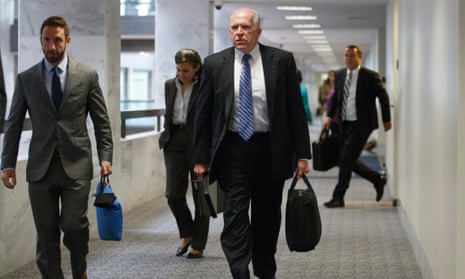The director of the Central Intelligence Agency expressed frustration with his Senate overseers and the media on Thursday, even as he and his fellow heads of US intelligence agencies pledged to win back the trust of a skeptical American public.
“I certainly believe having the public’s trust makes all of our jobs much easier and better,” Brennan said on a panel at an intelligence conference, where he was joined by his colleagues at the helms of the National Security Agency, the National Geospatial-Intelligence Agency and the Defense Intelligence Agency.
But ahead of an impending clash with the Senate intelligence committee, which is due to release a public version of a report into CIA torture in the coming weeks, Brennan rejected “the narratives I see floating around the media.”
Brennan has been locked in a heated dispute with his Senate overseers that escalated dramatically after agency officials breached a network firewall set up to allow committee investigators access to CIA documents relevant to their inquiry. The committee chairwoman, Democrat Dianne Feinstein of California, said on the Senate floor on 11 March that the CIA “just went and searched the committee’s computers.”
After initially denying the breach during a public appearance that day at the Council on Foreign Relations, Brennan apologized for it in July once the CIA’s inspector general determined CIA officials had improperly accessed Senate staffer emails and conducted keyword searches on some of them.
But Brennan sharply defended his March denial of the firewall breach and rejected Feinstein’s “allegations” about the episode, without naming her.
“This is part of the mischaracterizations. The Council on Foreign Relations, [moderator] Andrea Mitchell, said, did in fact CIA officers hack into the Senate computers to thwart the investigation on potential interrogation? Thwart the investigation, hacking in – no, we did not, and I said that’s beyond the scope of reason,” said Brennan, who noted that he ordered the inspector general’s review of the incident.
“When the inspector general determined that based on the common understanding between the CIA and the [committee] about this arrangement of computers, that our officers had improperly accessed it, even though these were CIA facilities, CIA computers, and CIA had responsibility for the IT integrity of the system, I apologized to them for any improper access that was done, despite the fact that we didn’t have a memorandum of agreement.
“What I’ve said to the committee and others is that if I’ve done something wrong, I’ll stand up and admit it, but I’m not going to take, you know, the allegations about hacking and monitoring and spying and whatever else, no. … When I think about that incident, I think there are things on both sides that need to be addressed.”
The Senate report, expected to be partially declassified this month, is said to have found post-9/11 CIA torture to be more brutal and less effective than it portrayed to the Bush administration and the Senate oversight committee. Many committee Republicans and the agency itself have already rejected the report’s findings as inaccurate.
Alongside Brennan, Adm Michael Rogers, the new NSA director, said he wanted to bolster public confidence in his agency that has been battered by the widespread digital and phone records surveillance revealed by whistleblower Edward Snowden.
Rogers declined an invitation by panel moderator Kimberly Dozier of the Daily Beast to quantify actual damage that Snowden’s disclosures have yielded, something that the NSA and its defenders have frequently asserted, without providing evidence.
“Those should be no doubt in anyone’s mind that I am watching groups change their behavior as a direct result of these revelations, groups that represent a direct threat to the citizens of this nation and those of our friends and allies,” Rogers said.
Separately, Rogers conceded that his agency was too slow to recognize the Islamic State (Isis) transitioning earlier this year from a terrorist group into the jihadist army that has invaded and conquered portions of northern and western Iraq.
“I wish we had been a little stronger on it,” Rogers said.
Rogers, Brennan and the acting head of the DIA, David Shedd, said US intelligence agencies lost a degree of visibility into Iraq once US troops withdrew in 2011, and suggested the same could occur in Afghanistan as US troop levels diminish amidst a persistent Taliban insurgency.
Afghans’ willingness to provide intelligence to the US will be part of “a larger risk calculus associated with the conditions on the ground,” Shedd said.

Comments (…)
Sign in or create your Guardian account to join the discussion